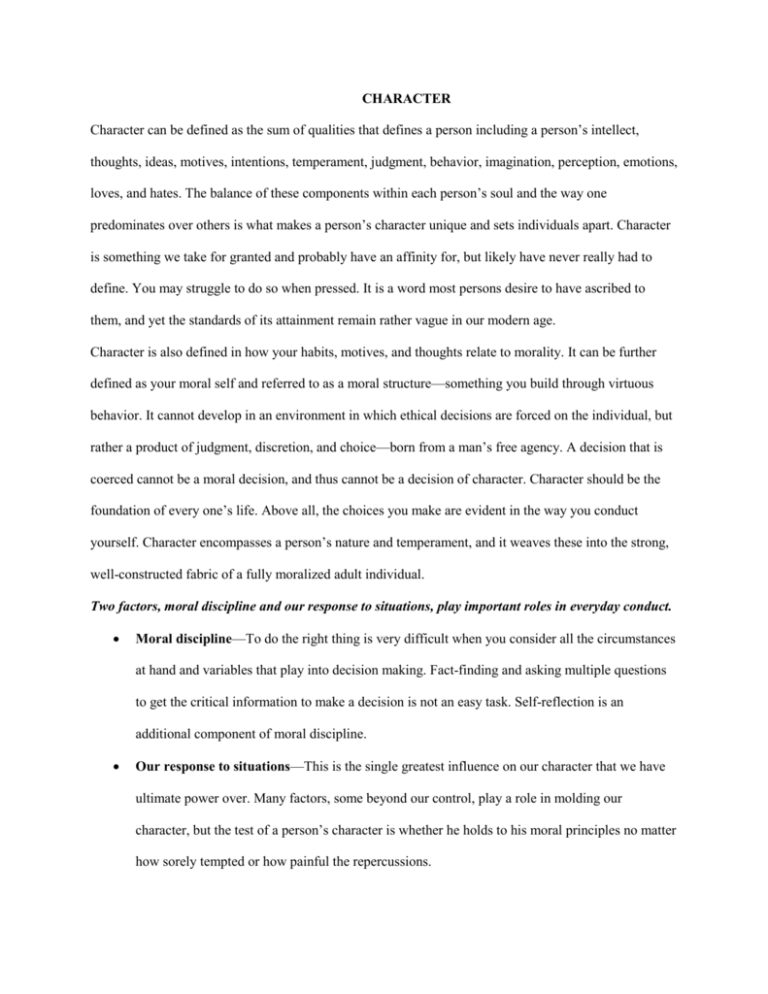CHARACTER Character can be defined as the sum of qualities that
advertisement

CHARACTER Character can be defined as the sum of qualities that defines a person including a person’s intellect, thoughts, ideas, motives, intentions, temperament, judgment, behavior, imagination, perception, emotions, loves, and hates. The balance of these components within each person’s soul and the way one predominates over others is what makes a person’s character unique and sets individuals apart. Character is something we take for granted and probably have an affinity for, but likely have never really had to define. You may struggle to do so when pressed. It is a word most persons desire to have ascribed to them, and yet the standards of its attainment remain rather vague in our modern age. Character is also defined in how your habits, motives, and thoughts relate to morality. It can be further defined as your moral self and referred to as a moral structure—something you build through virtuous behavior. It cannot develop in an environment in which ethical decisions are forced on the individual, but rather a product of judgment, discretion, and choice—born from a man’s free agency. A decision that is coerced cannot be a moral decision, and thus cannot be a decision of character. Character should be the foundation of every one’s life. Above all, the choices you make are evident in the way you conduct yourself. Character encompasses a person’s nature and temperament, and it weaves these into the strong, well-constructed fabric of a fully moralized adult individual. Two factors, moral discipline and our response to situations, play important roles in everyday conduct. • Moral discipline—To do the right thing is very difficult when you consider all the circumstances at hand and variables that play into decision making. Fact-finding and asking multiple questions to get the critical information to make a decision is not an easy task. Self-reflection is an additional component of moral discipline. • Our response to situations—This is the single greatest influence on our character that we have ultimate power over. Many factors, some beyond our control, play a role in molding our character, but the test of a person’s character is whether he holds to his moral principles no matter how sorely tempted or how painful the repercussions. Possessing a strong character is a necessity for pharmacy directors. Critical and sometimes ethical decisions need to be made in all areas under your control. As the pharmacy leader, you are in a position of high trust, and you will be tempted from time to time to perform actions and make decisions that are not in the best interest of your broad-based constituents. Dealings with vendors, hospital administration, physicians, and other employees can offer opportunities for self-gain or less than legal actions. It goes without saying that pharmacy directors must guard against such temptations. Your professional and moral compass will guide you in such activities and actions. But one must be every mindful of such situations and always on guard and aware. Pharmacy directors make decisions that affect the activities and lives of your patients, employees, and coworkers. You need to think about those decisions from several aspects and ask yourself the following questions: • How will the outcome or result of this decision affect our patients? • How will the outcome or result of this decision affect our people—our employees? These two simple questions may require more questions to obtain the necessary answers to the ultimate decision. When the answer to both of these questions is positive, then you know you are on the right path to being fair and right. These two questions also may pose additional dilemmas for you to sort out. All that is OK! Making the right decision is very important to a long-lasting solution. But remember that no decision is a decision, and you must deliberate carefully and act in a timely manner in making your choices so action and activity can occur. Ten Important Traits That Will Support Your Quest for Character 1. Be honest. Tell the truth; be sincere; don't mislead or withhold key information in relationships of trust; don't steal or take credit for the work of others. 2. Demonstrate integrity. Stand up for your beliefs about right and wrong; be your best self; resist social pressure to do the wrong thing for the right reason. 3. Keep promises. Keep your word and honor your commitments; pay your debts and obligations. Remember to return favors. 4. Be loyal. Stand by your assistant directors and those whom you lead, in addition to family, friends, employers, community, and country. Never talk about people behind their backs. Give credit to others first and foremost. 5. Be responsible. Think about your actions before you act; consider the consequences; be accountable for your actions and “take your medicine.” 6. Pursue excellence. Do your best with what you have; don't quit easily. 7. Be kind and caring. Show you care through generosity and compassion; don't be selfish or mean; put other people first. 8. Treat all people with respect. Be courteous and polite; judge all people on their merits; be tolerant, appreciative, and accepting of individual differences; use the word “I” only as a last resort in communication. 9. Be fair. Treat all people fairly; be open-minded about the opinions and positions of others; listen to others and try to understand what they are saying and feeling. 10. Be a good citizen. Obey the law and respect authority; vote, volunteer your efforts, and protect the environment.






